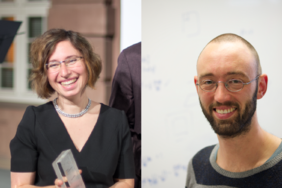The University of Tübingen is extending its expertise in artificial intelligence: the university appointed five new professors all active in the field of machine learning. Anna Levina investigates the organization of neuronal processes and develops methods to test their computing capacities. At the Faculty of Medicine, Philipp Berens is working on implementing machine learning algorithms into clinical diagnostics with a special focus on degenerative eye diseases. Together with Anna Levina and Philipp Berens, both active members of the Bernstein Network Computational Neuroscience, the University of Tübingen appointed Andreas Geiger, Philipp Hennig and Michael Krone.
"We are delighted that we were able to win these excellent young scientists for the University of Tübingen," said Professor Bernd Engler, Rector of the University of Tübingen. "This gives a face to the vision of Cyber Valley and reveals very specific tasks in the field of machine learning, which will be dealt with here on site.”
"The international appeal of the Cyber Valley is growing visibly," says Science Minister Theresia Bauer. "The outstanding talents that could be attracted by the University of Tübingen prove that we can quickly realize our idea of turning the area of Stuttgart-Tübingen into an international key player in the field of artificial intelligence. The Ministerium für Wissenschaft, Forschung und Kunst Baden-Württemberg supports this development to the best of its ability."
Philip Berens
Philipp Berens (born in 1981) was appointed Heisenberg Professor for "Data Science in Vision Research" at the Institute for Ophthalmic Research in April 2018. Since 2016, he is head of the research group of the same name and a member of the Cluster of Excellence Werner Reichardt Centre for Integrative Neuroscience (CIN) in Tübingen. Philipp Berens studied bioinformatics and philosophy at the University of Tübingen. He was a PhD student at the Max Planck Institute for Biological Cybernetics in Tübingen as well as the Baylor College of Medicine in Houston (USA). In 2013, he finished his PhD on visual population coding at the International Max Planck Research School in Tübingen. Berens was a postdoctoral researcher at the Bernstein Center for Computational Neuroscience (BCCN)Tübingen in the laboratory of AI researcher Matthias Bethge. In addition, he was a postdoctoral fellow at Baylor College. In 2015, he received the Bernstein Prize of the German Federal Ministry of Education and Research.
As a data scientist, Berens investigates the neural circuits in the retina at the University’s Research Institute of Ophthalmology. His goal is to decode the principles of neural computation in vision and to understand how neural functioning is affected by degenerative diseases. His research group develops machine learning algorithms which can be used in clinical diagnostics. "In basic research as well as in clinical diagnostics there are increasingly complex, multimodal data sets: they combine different types of data, from physiology, anatomy or genetics for example. Merging these types of data remains a major challenge," he explains.
Anna Levina
Anna Levina (born in 1981) was appointed junior professor for "Criticality and Optimality in Neural Systems" in the Department of Computer Science in July 2018. She studied mathematics at the University of St. Petersburg and moved to the University of Göttingen in 2004, where she finished her PhD on "Identification in Mathematical Models" in 2008. She became a postdoctoral fellow at the Max Planck Institute for Dynamics and Self-Organization in Göttingen and continued her research in 2011 at the Max Planck Institute for Mathematics in the Sciences in Leipzig.
From 2015 to 2017 Anna Levina was a fellow at the Institute of Science and Technology in Klosterneuburg, Austria. Since April 2017, she works in the field of computer-aided neuroscience at the University of Tübingen, the Bernstein Center for Computational Neuroscience and the Max Planck Institute for Biological Cybernetics in Tübingen. In 2017 she was awarded the Sofja Kovalevskaja Prize of the Humboldt Foundation, one of the highest endowed scientific awards in Germany.
Her research focuses on the principles behind the organization and mechanisms of neuronal processes: How does neuronal connectivity develop with billions of neurons in the brain? And how is information ideally transferred from one brain structure to another? These and similar questions are the focus of Levina's research. The mathematician aims to develop tools and models for data analysis to investigate neuronal states and their computational abilities. The results could pave the way for the optimization of artificial neural networks.
Modified and translated from the original text by Antje Karbe, University of Tübingen
Original text (German):
https://www.uni-tuebingen.de/en/university/news-and-publications/press-releases/press-releases/article/neue-expertise-zur-kuenstlichen-intelligenz.html
